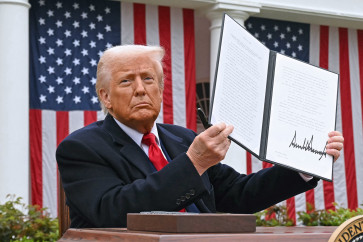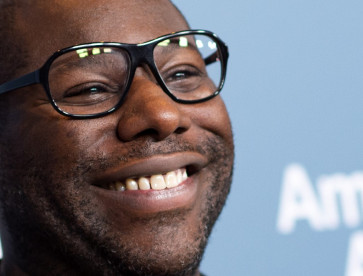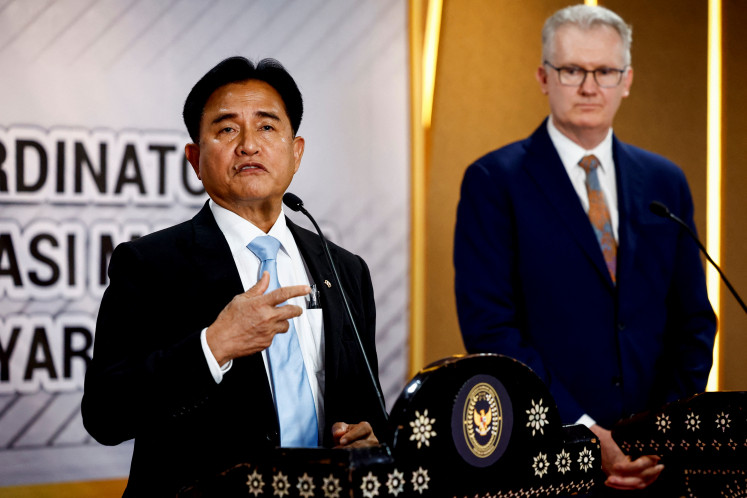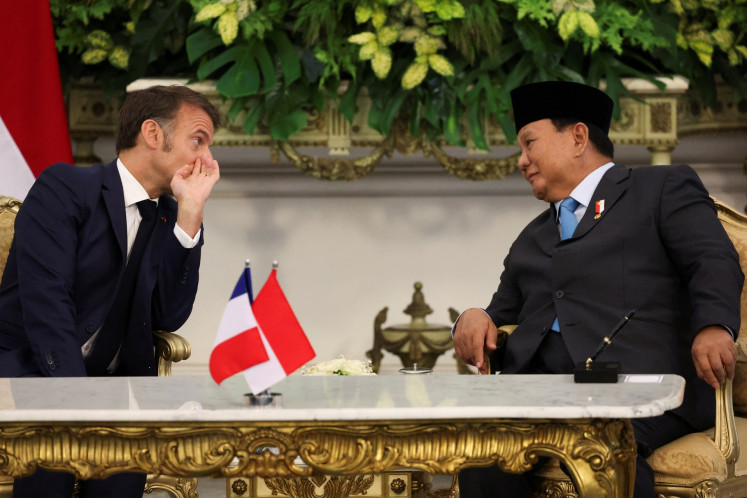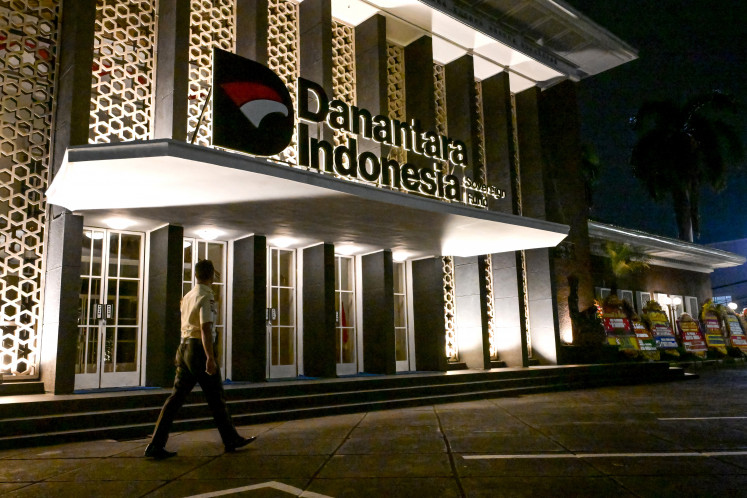China's ire finally flares as US opens Huawei CFO case
In its first move since Meng Wanzhou was arrested Dec. 1, Chinese Vice Foreign Minister Le Yucheng summoned Canadian ambassador to China John McCallum to urge the immediate release of Huawei’s chief financial officer, the foreign affairs ministry said in a statement Saturday.
Change text size
Gift Premium Articles
to Anyone
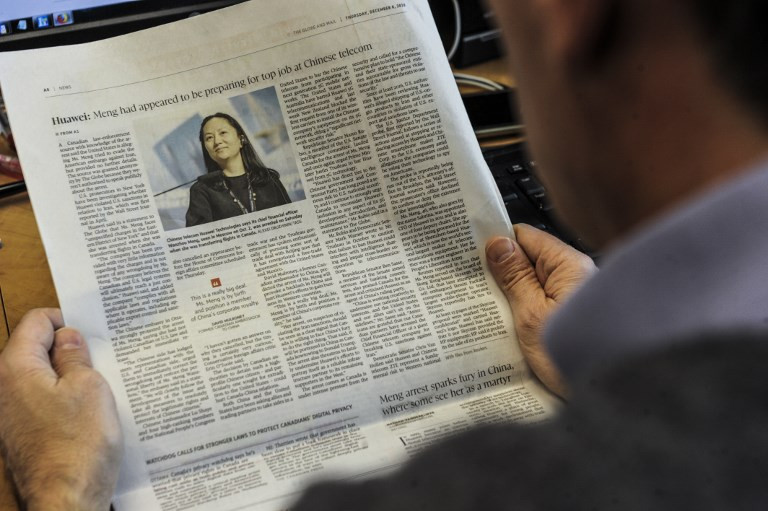 An illustration shows a journalist reading a news page about tech giant Huawei in The Globe and Mail in Montreal, Canada, December 6, 2018. The arrest of a top executive of Huawei at the request of US authorities signals a toughening stand in Washington on dealing with Chinese tech firms amid longstanding concerns over cyberespionage. Meng Wanzhou (pictured on the news page), Huawei's chief financial officer, was detained this week in Canada and faces an extradition request from US authorities over an investigation into suspected Iran sanctions violations by the Chinese technology giant.
Clement SABOURIN / AFP (AFP/Clement Sabourin)
An illustration shows a journalist reading a news page about tech giant Huawei in The Globe and Mail in Montreal, Canada, December 6, 2018. The arrest of a top executive of Huawei at the request of US authorities signals a toughening stand in Washington on dealing with Chinese tech firms amid longstanding concerns over cyberespionage. Meng Wanzhou (pictured on the news page), Huawei's chief financial officer, was detained this week in Canada and faces an extradition request from US authorities over an investigation into suspected Iran sanctions violations by the Chinese technology giant.
Clement SABOURIN / AFP (AFP/Clement Sabourin)
C
hina has threatened Canada with grave consequences if a top executive at Huawei Technologies Co.is not immediately released, calling her arrest as she changed planes in Canada “unreasonable, unconscionable and vile in nature.”
In its first move since Meng Wanzhou was arrested Dec. 1, Chinese Vice Foreign Minister Le Yucheng summoned Canadian ambassador to China John McCallum to urge the immediate release of Huawei’s chief financial officer, the foreign affairs ministry said in a statement Saturday.
Le told McCallum that the arrest was a severe violation of a Chinese citizens’ legitimate rights and interests. The move ignored the law, and Canada should be held accountable if Meng was not immediately released, Le said in the statement.
Meng’s arrest, on allegations that she committed fraud to sidestep sanctions against Iran, has become a flash-point in trade tensions between the US and China, roiling markets.
On Friday, the US began a market-shaking case against the Chinese telecoms giant in a Vancouver courtroom, alleging that Meng had hidden ties between Huawei and a company called Skycom that did business in Iran, said a lawyer representing Canada during the court hearing. Canada is presenting the case on behalf of the US, which wants to extradite Meng.
Meng, 46, daughter of Huawei’s founder, is spending the weekend in jail after a decision on whether to grant bail was not reached. The case will continue on Monday.
“We will continue to follow the bail hearing,” Huawei spokesman Glenn Schloss wrote in an emailed statement. “We have every confidence that the Canadian and US legal systems will reach the right conclusion.”
Meng was charged with conspiracy to defraud banks and should not be granted bail because she may flee, Crown attorney John Gibb-Carsley said during the court hearing in Vancouver earlier on Friday. Banks in the US cleared money for Huawei, but unbeknownst to these financial firms, they were conducting business with Skycom in contravention of the sanctions, the lawyer said.
In her dealings with the banks, Meng hid ties between Huawei and Skycom, when in fact Skycom employees worked for the Chinese telecom-equipment giant, Gibb-Carsley added. He noted that some Skycom workers used Huawei email addresses and employees in Iran used a different set of stationary depending on whether they were doing Huawei or Skycom work.
The Crown attorney argued against granting Meng bail because she’s so wealthy that she will easily be able to pay whatever is required and then flee. Since learning of the investigation into her alleged activities, Meng has avoided the US and other Huawei executives have stopped traveling to the US, he added.
“To feel the pull of bail, we are in a different universe in this case,” he said.
Meng’s defense lawyer David Martin said the evidence presented doesn’t prove she broke either US or Canadian law. US sanctions law is complex, has changed over time, and there are exemptions for telecom equipment in the country’s Iran sanctions, Martin argued.
A major pillar of the US case is a misrepresentation that Meng allegedly made to a US bank in 2013, referred to as “Financial Institution 1.” Martin identified the firm as HSBC Holdings Plc, but he disputed the US allegation that Meng misrepresented anything to that financial institution. “HSBC has rich experience in trade compliance,” he added.
Meng was arrested in Vancouver at the behest of US authorities. She was flying from Hong Kong to Mexico with a stop in the Canadian city. Meng spends two weeks a year in Vancouver, her family owns properties in the area, and she has a 16-year-old son at school in Boston. Martin, her lawyer, said she would never breach a court order on bail because that would embarrass her father and China.
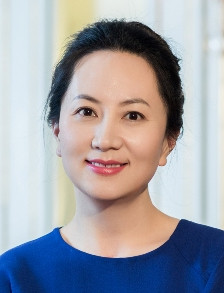
The case has hit markets already hammered by months of rising trade tension between the world’s two largest economies. The move has especially enraged China, which called for her release. Meng is one of China’s most prominent businesswomen. She is the daughter of Ren Zhengfei, the founder of Huawei, a national champion at the forefront of President Xi Jinping’s efforts for China to be self-sufficient in strategic technologies. While the US routinely asks allies to extradite drug lords, arms dealers and other criminals, detaining a major Chinese executive in this manner is unusual.
The alleged transactions involved more than $100 million between 2010 and 2014, according to US evidence filed with the court in Vancouver on Friday:
- During a meeting with HSBC, Meng used PowerPoint slides for a presentation that included several misrepresentations.
- She allegedly said Huawei operated in Iran in strict compliance with applicable laws and sanctions, although Skycom was using the U.S. financial system to conduct prohibited Iran transactions.
- Meng stated Huawei’s engagement with Skycom was a normal business cooperation, when Skycom was in fact entirely controlled by Huawei.
Thumbs up
Meng entered the courtroom in downtown Vancouver at 10:25 a.m. local time, wearing a green sweatsuit and accompanied by her lawyer. She sat at the back of the courtroom in a clear plastic cubicle. About 100 people looked on from the public gallery. She gave a thumbs up to her lawyer before proceedings began.
Throughout the hearing, Meng sat in the back of the courtroom mostly still, occasionally leaning toward her interpreter. At one point, the interpreter stepped forward to ask the judge to ask everyone to proceed slowly so she could keep up. The judge agreed.
The hearing in Vancouver is the start of a long legal process in Canada that could end with Meng being sent to the US to stand trial. Even though the North American neighbors have a longstanding treaty governing extradition, it can take months, even years, for a defendant to be handed over, if at all.
Should a judge agree to extradite Meng, she would have multiple chances to appeal the decision.
— With assistance by Christian Berthelsen, Josh Wingrove, Nate Lanxon, and Rachel Chang


